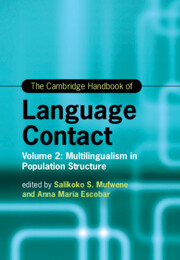Book contents
- The Cambridge Handbook of Language Contact
- Cambridge Handbooks in Language and Linguistics
- The Cambridge Handbook of Language Contact
- Copyright page
- Contents
- Maps Volume II
- Figures Volume II
- Tables Volume II
- Contributors
- Preface
- Introduction
- Part One Multilingualism
- 2 Societal Multilingualism
- 3 Individual Bilingualism
- 4 Codeswitching and Translanguaging
- 5 Urban Contact Dialects
- 6 Multilingualism and Super-Diversity: Some Historical and Contrastive Perspectives
- 7 Multilingualism and Language Contact in Signing Communities
- 8 Multilingualism in India, Southeast Asia, and China
- 9 Monolingualism vs. Multilingualism in Western Europe: Language Regimes in France, Spain, and the United Kingdom
- Part Two Contact, Emergence, and Language Classification
- Part Three Lingua Francas
- Part Four Language Vitality
- Part Five Contact and Language Structures
- Author Index
- Language Index
- Subject Index
- References
7 - Multilingualism and Language Contact in Signing Communities
from Part One - Multilingualism
Published online by Cambridge University Press: 02 June 2022
- The Cambridge Handbook of Language Contact
- Cambridge Handbooks in Language and Linguistics
- The Cambridge Handbook of Language Contact
- Copyright page
- Contents
- Maps Volume II
- Figures Volume II
- Tables Volume II
- Contributors
- Preface
- Introduction
- Part One Multilingualism
- 2 Societal Multilingualism
- 3 Individual Bilingualism
- 4 Codeswitching and Translanguaging
- 5 Urban Contact Dialects
- 6 Multilingualism and Super-Diversity: Some Historical and Contrastive Perspectives
- 7 Multilingualism and Language Contact in Signing Communities
- 8 Multilingualism in India, Southeast Asia, and China
- 9 Monolingualism vs. Multilingualism in Western Europe: Language Regimes in France, Spain, and the United Kingdom
- Part Two Contact, Emergence, and Language Classification
- Part Three Lingua Francas
- Part Four Language Vitality
- Part Five Contact and Language Structures
- Author Index
- Language Index
- Subject Index
- References
Summary
This chapter has three main objectives. This chapter first describes multilingualism as a natural force, deeply rooted in Asian and African societies prior to the emergence of nation-states and currently flourishing and evolving in India. Parts 2– 4 of this chapter provide evidence from pre-colonial India and its neighboring countries to underscore the differential evolution of Indian and Chinese political multilingualism in both qualitative and quantitative terms. The chapter closes by investigating the dynamics of linguistic, non-linguistic, and cultural forces in Southeast Asia and China, forces that shaped, sustained, and spread pre-and post-fifteenth-century Indian multilingualism in and outside India. Super-diversity is a key marker of Ancient as well as Modern India. This region represents a microcosm of different languages, races, religions, and cultures that have blended and brought about a special unity in diversity. The chapter shows that sustainable and stable Indian multilingualism defies the conventional belief that multilingualism cannot survive or flourish without a writing system and/or government intervention. Salient linguistic and ecological features are identified to highlight the exceptional nature of Indian multilingualism and its spread to Southeast Asia and China.
Keywords
Information
- Type
- Chapter
- Information
- The Cambridge Handbook of Language ContactVolume 2: Multilingualism in Population Structure, pp. 172 - 200Publisher: Cambridge University PressPrint publication year: 2022
